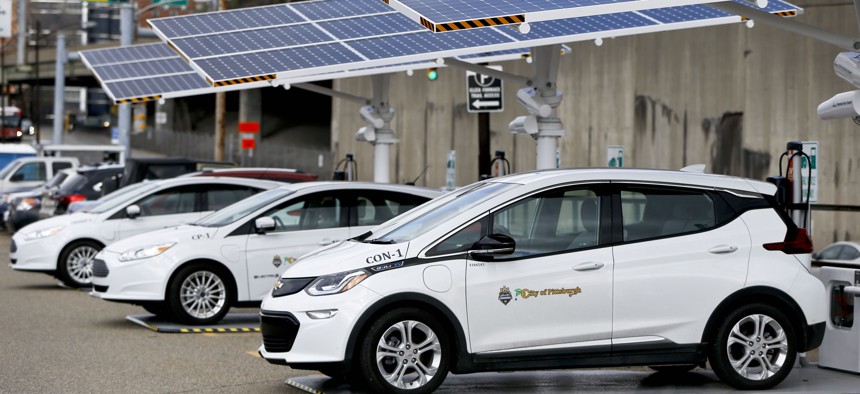Mayors Seek to Offset 'Diminished' Federal Role on Climate Change

Some of the city of Pittsburgh's fleet of electrical vehicles are parked under solar charging panels before a news conference announcing the facility debut, Wednesday, April 18, 2018, in Pittsburgh. AP Photo/Keith Srakocic

Connecting state and local government leaders
They're meeting with business leaders in San Francisco this week to discuss the issue.
The main group representing mayors around the U.S. says its members are taking action to confront climate change as federal leadership lags.
Members of the U.S. Conference of Mayors and business leaders are gathering in San Francisco on Tuesday to discuss ways they can work together on the issue. A report released along with the event also looks at ways cities are seeking to lower greenhouse gas emissions and how they're seeing the effects of climate change locally.
The report describes recent federal leadership on climate issues as “greatly diminished,” and alludes to the Trump administration's withdrawal from the Paris climate accord, as well as steps the Environmental Protection Agency has taken to soften standards for power plant emissions and vehicle fuel efficiency.
Tuesday's event is being held by the Alliance for a Sustainable Future, which is a partnership between the conference of mayors and the Center for Climate and Energy Solutions, a nonprofit group.
Salt Lake City Mayor Jackie Biskupski, who currently chairs the alliance, spoke with Route Fifty by phone on Monday.
"I think it sends a message worldwide that the United States is still planning to live up to the Paris agreement and we are doing that work through state governors and mayors across the country," she said when asked about why the meeting this week is significant.
The Paris accord was a landmark agreement that 195 countries reached in 2015 with the aim of reducing greenhouse emissions. President Trump announced last year that he would pull the U.S. out of the agreement, making a case that it was unfair to the U.S. The U.S. Conference of Mayors has opposed Trump's decision since that time.
Much of the report released on Tuesday is based on a survey that 158 cities in 39 states responded to in its entirety, or in part.
Of the respondents, 119 cities answered a question about changes they’ve experienced during the past five years in the frequency, intensity or location of various climate-related events, like flooding, drought, wildfire or insect borne diseases.
Ninety five percent, or about 113, cited at least one change. The category where the most cities—94 of them—reported these sorts of changes was heavy rain or inland flooding. Eighty-one cities said they’d had changes with heatwaves, and 63 with droughts.
Biskupski said Salt Lake City in the past two decades has seen declines in mountain snowpack that provides a water source for the city.
All of the cities did not respond to all of the survey questions and most of the results are displayed in the report only in terms of percentages, instead of total responses, making them difficult to fully interpret.
But according to the report and additional information provided by a Center for Climate and Energy Solutions spokesman, 70 cities indicated that they had launched or significantly expanded a climate initiative or policy in the past 12 months. And, in the next year, 65 cities are planning to launch new climate policies and initiatives.
Common policies and activities that city officials responding to the survey said they had underway to help cut greenhouse gas emissions involved bus transit, bike lanes, promoting bicycle commuting and implementing energy efficiency guidelines for municipal buildings.
The report also provides some information about how cities have diversified their fleets to include vehicles that are powered by alternatives to gasoline and diesel fuel.In general the findings show that these traditional fuels are still most common.
For instance, even in surveyed cities with “green vehicle procurement” policies, nearly three-quarters of the 20,842 light-duty vehicles still burn gasoline or diesel. The same is true for over half of the 4,541 buses in those places.
Pittsburgh is one example of a city that is taking steps to cut emissions from its municipal fleet. Mayor Bill Peduto has indicated that he wants city vehicles there to be "fossil fuel free" by 2030. In April, the city rolled out five solar charging stations for the city's electric vehicles.
In Salt Lake City, Biskupski has backed a plan during her time in office to transition the city to 100 percent renewable energy by 2032 and to reduce greenhouse gas emissions there by 80 percent by 2040. She helped broker an agreement in 2016 with Rocky Mountain Power as part of this effort and plans to highlight it at this week's meeting.
"If the cities aren't leading the way on this issue and time goes by without significant effort to go carbon neutral," the mayor said, "we'll end up in a complete disaster."
Bill Lucia is a Senior Reporter for Government Executive's Route Fifty and is based in Washington, D.C.

NEXT STORY: Virginia Announces Partnership for In-Vehicle Alcohol Detection Sensors





